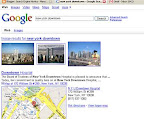Universal Search - the best answer
I've been planning for a few days to post about Google's announcement that the next big thing is the so-called "Universal Search." This is the holy grail, judging from posts on Google's official blog. We insiders are excited about Universal Search as only geeks can be. But the Googlers in particular should be excited; after all, it is best answer. The best answer is always the best answer.
I would say that I noticed the changes in Google's UI before I read about Universal Search (US). Here's a quick look at the new SERP:

Click on the image for a larger size. Basically, in the SERP for [steve jobs], the Google team has managed to squeeze image results and natural results, as well as links near the top to News and Video, where there would also be pertinent information about Steve Jobs. A small change, but a change, nonetheless. However, if we were to look at another search,

This time for [new york downtown], notice that there are image results first on the SERP, then a map, and then the natural results come later. This is useful for searches involving place names, which would be better suited for a map search anyway, and are probably tried by less experienced users. This is serving Google's goal of being the one-stop-shop for information for anyone - web savvy or not.
Now look what creeps into the SERP for [darth vader]:

There's a Google video result, about halfway down the first page. The video result would not be as highly ranked, except that Google's new US algorithm judged the video to be just as relevant as the 5th or 6th natural result. Then notice at the bottom:

We've got news results at the bottom of the page as well, in addition to related searches that might be just as useful as the user's intended search phrase.
These are just a few examples to show what Google is striving toward - a truly comprehensive information search, that will let people from all demographics find the information they need, regardless of which search engine or portal they use. Eventually, if US becomes fully developed, people will no longer be limited to a certain type of information when they search. No longer will people need to go to JStor find scholarly publications, or to a news search for current events. After all, if a general search engine has so many categories it is limited from searching, how can it really be comprehensive?
Labels: Google, product reviews, universal search


0 Comments:
Post a Comment
Subscribe to Post Comments [Atom]
<< Home